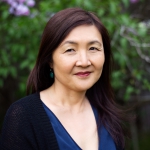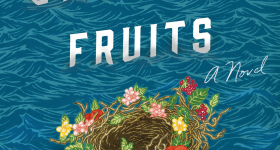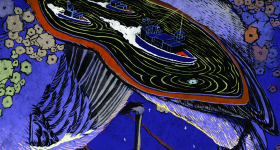What if you were an incarcerated Japanese American citizen in World War II and were later freed by a victorious Japanese Imperial Army? This is how Peter Tieryas’s latest novel, The United States of Japan, begins, as characters Ruth Ishimura and Ezekiel Song find themselves hopeful and uncertain at the impending birth of their son, Beniko. Forty years later, Beniko, a censor of ubiquitous electronic virtual reality games for the United States of Japan, is assigned to investigate the existence of a subversive game with an alternate history in which the United States defeats Japan in the war. What follows are deftly executed twists and turns in a vivid world full of deception, violence and surprising loyalty.
Tieryas's first novel, Bald New World was selected as one of Buzzfeed’s 15 Highly Anticipated Books of 2014 and named one of the Best Books of Summer 2014 by Publisher’s Weekly. His collection of short stories, Watering Heaven, was long-listed for the Frank O’Connor Int’l Short Story Award. His short fiction has appeared in Indiana Review, Kyoto Journal, New Letters, New Orleans Review, and ZYZZYVA, among others. He is also a VFX artist who has worked on films like Men in Black 3, Guardians of the Galaxy, Alice in Wonderland, and Hotel Transylvania, and he has been a technical writer for LucasArts, the gaming division of LucasFilm.
I spoke with Tieryas about the choices he made in writing his sci-fi thriller.
How did The United States of Japan come to be?
I grew up in the States, but in 1987 I moved to Korea for two years. It was a turbulent time. Every time I turned on the news, I saw student protests and people being arrested. I was only eight or nine, and I remember some of the elders being upset I had a Nintendo (brought from the States), primarily because it was made in Japan. I was told they could speak fluent Japanese and even had Japanese names from way back during the occupation, but I had no idea why. That sense of mystery haunted me until I grew older and found out more about what happened during WWII. You could say the roots of The United States of Japan began way back then.
That was right around the time Chun Doo-Hwan was president and people were demanding democratic reforms. The Olympics were taking place in the summer of 1988. You were in Korea at the cusp of change. And then you moved back?
Yes, we moved to California.
California in The United States of Japan is such a place of devastation.
The Empire develops atomic capabilities before America and destroys much of Northern California. But Los Angeles is a technological marvel, the capital of the United States of Japan, and one of the grandest cities in the world in the novel. It reflects my love of L.A. Another city I love, San Francisco, gets destroyed as a way of separating my book from Philip K. Dick’s phenomenal The Man in the High Castle.
Dick is a sci-fi legend who’s written novels like Do Androids Dream of Electric Sheep?, which inspired the movie, Bladerunner. His The Man in the High Castle is similar to your novel in that it depicts a world in which Nazi Germany and Imperial Japan won World War II. You’ve talked about how The United States of Japan is the ‘spiritual sequel’ to this novel. How so?
It’s spiritual in the sense that The Man in the High Castle is one of my favorite books and I was inspired by it, but it isn’t a direct continuation. There were so many things about Japan and Asia I felt were not even touched upon in Dick’s novel that I wanted to explore. One of the questions that compelled me was, what would it mean to be Asian in an America where Asians ruled? A part that has stuck with me since I wrote it is when two characters in The United States of Japan realize just after the Empire wins in 1948 that their child “won't have to grow up feeling inferior” for being Asian.
So many complex and compelling characters in your novel.
I try to write characters who are amalgamations of people I know, as well as embodiments of the ideas I want to thematically explore. Of course, there’s a little bit of me in every character, but the most interesting characters are the ones I don’t identify with at all and have very different personalities from me. At the same time, if there’s one thing I learned in psych classes at Berkeley, it’s that no one can be broken down into a simple formula. People are inconsistent and have all types of layers that are at war with each other. Agent Akiko Tsukino is the best example of that and one of my favorite characters to write.
Akiko is a fascinating character. All the women in The United States of Japan kick butt. Seriously. We don’t always see so many active, smart, powerful women.
I’m really glad you feel that way! I don’t know if this sounds odd though, but I didn’t really try to think of Akiko as a woman character, only a complicated character I considered the “modern samurai.” (Note for readers: all the characters in USJ have Japanese names as part of an imperial decree, even they’re of different ethnicities from all over the world).
The world you’ve written is so vivid, I felt a loss for the world we actually live in when I was reading it. How much of that technological expertise came from your experience working for game companies?
It informed huge segments of the gaming company that Ben works for as a censor. I paid tribute to many of my favorite titles from the land of the rising sun through this alternate world.
That’s Beniko Ishimura. He’s 39-years-old for most of the book.
A symbolic number, where he’s just about to edge into the 40s. One of the big themes I wanted to emphasize was mortality, how as you get older, you become much more aware of your own limitations. I feel this fear would be amplified to the umpteenth in an authoritarian society where you can't trust anyone. It’s also paying tribute to another of my favorite books, 1984, where Winston is also 39.
I was reminded a lot of 1984 when I was reading your book. The way you structured The United States of Japan around Ben’s life made the book really suspenseful.
The ending was the first part I wrote. The whole book revolves around a decision Ben made early in his life. So then Ben and Akiko became the focus of the story with Akiko being, for me, the main character, and the truths about each of them being revealed piece by piece. Once I figured that out, the rest of the structure came. I’m simplifying here because this was about two to three years of hammering, restructuring, ripping out, adding, and finally resolving.
What’s your advice for other writers?
I’d say get lots of experience, travel everywhere, and read as many books as you can. It's not a race, but a personal journey. You almost have to be masochistic to keep writing because of all the rejections, but keep writing and find the story only you can tell.










Comments